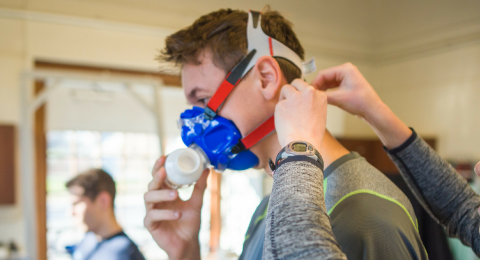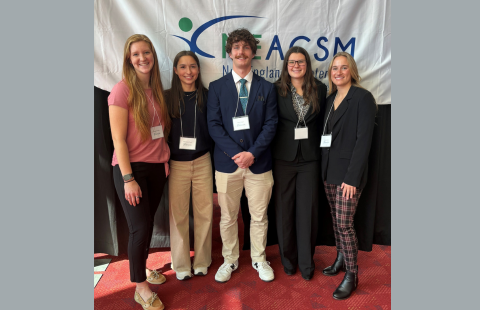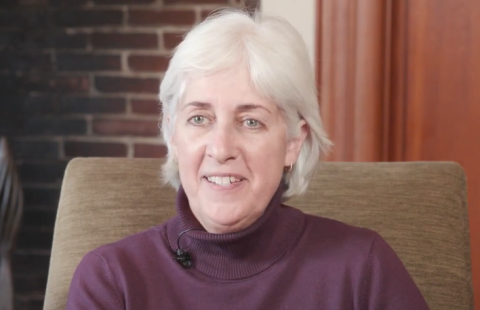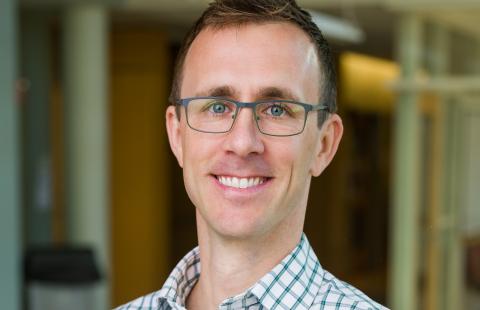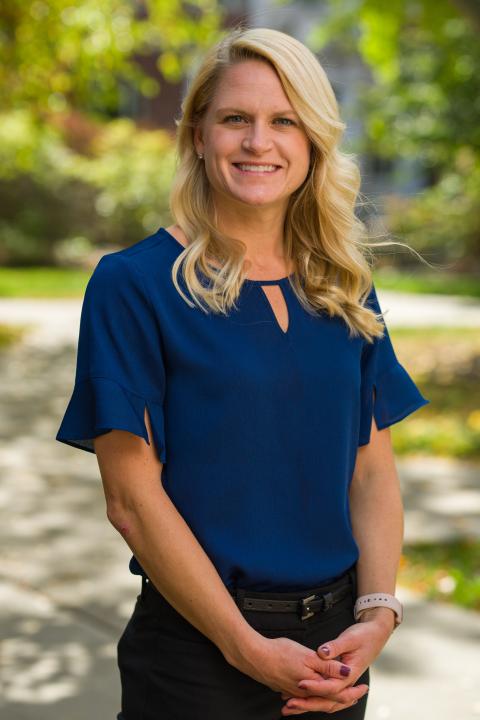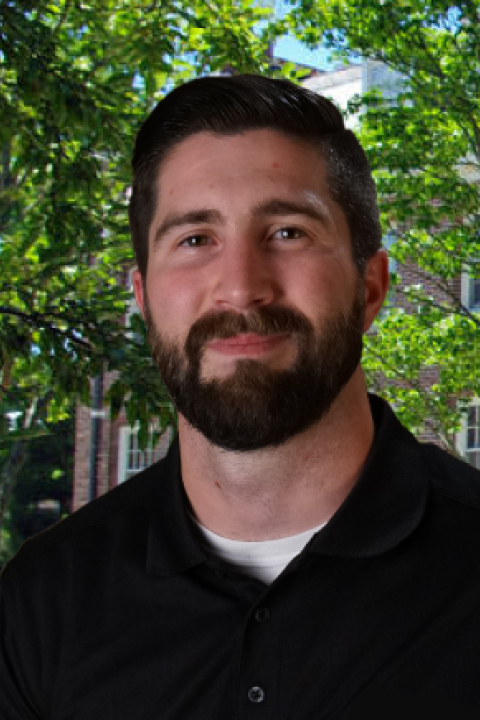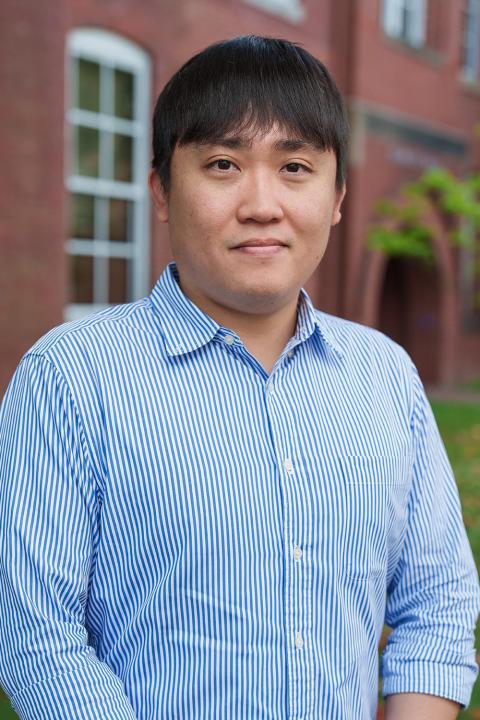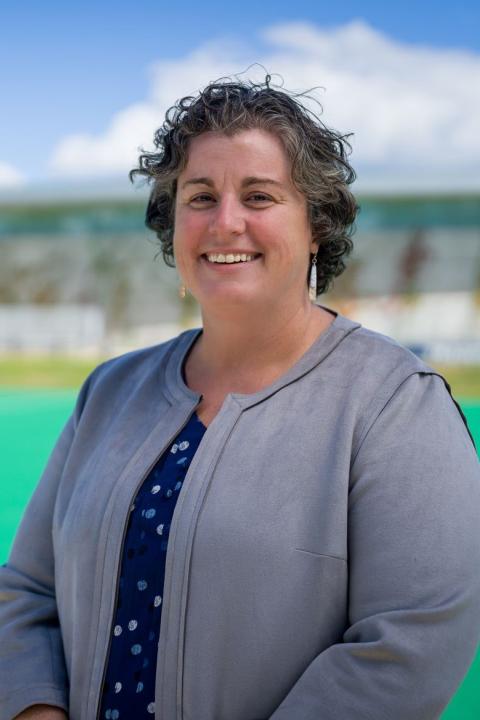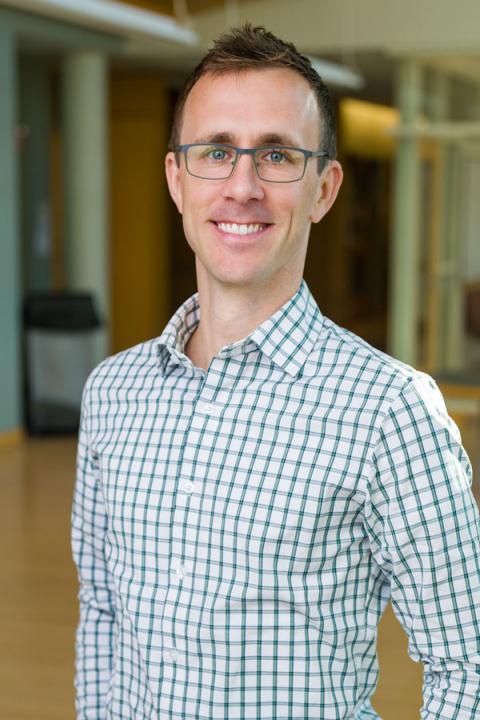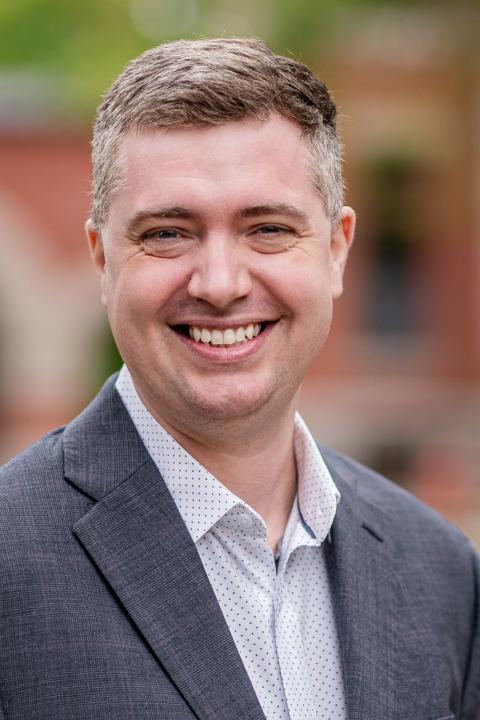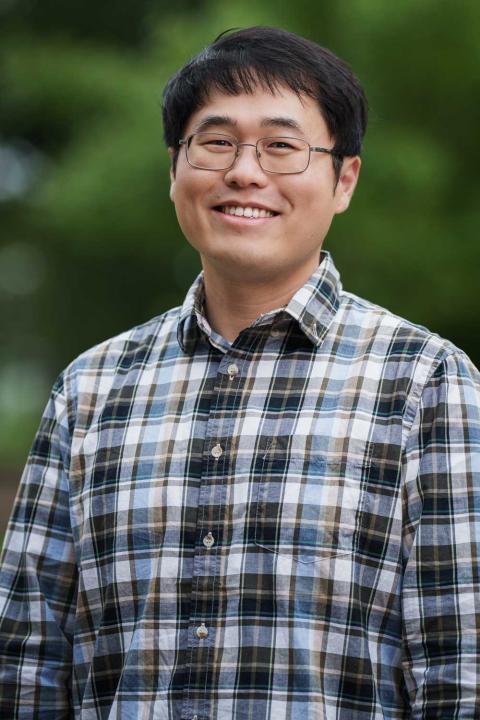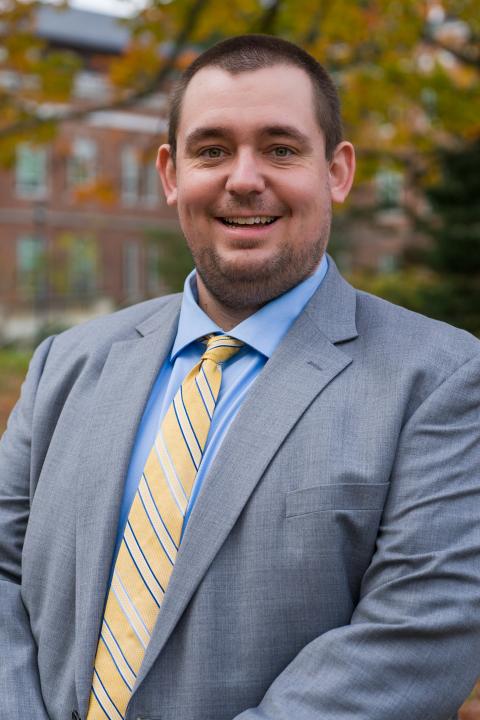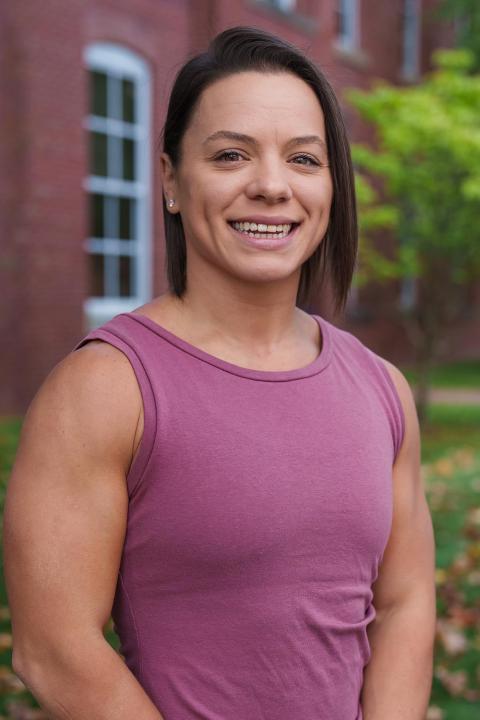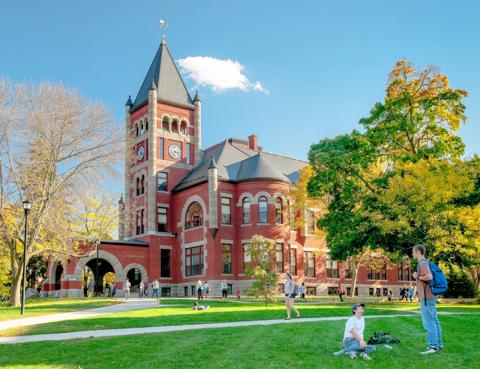The Exercise Science major at UNH focuses on enhancing health and fitness across diverse populations. You'll explore scientific principles applied to physical performance and health through hands-on experience in advanced laboratories and service learning programs. Prepare for careers in health promotion, sports medicine, and clinical research, or pursue advanced studies in the expanding field of exercise science.
WHAT IS EXERCISE SCIENCE?
Exercise science is the study of how exercise training and physical activity affect health and human performance. A degree in exercise science will prepare you for a career in strength and conditioning, health and fitness promotion, education programs in hospitals, medical device and pharmaceutical sales, sports medicine and wellness centers, rehabilitation facilities and clinical research programs. The major will also prepare you for advanced degree programs in exercise science, biomechanics, nutrition, biological sciences, public health and medicine. Exercise science is a growing field, and emphasis on exercise as preventative care and part of long-term rehabilitation from chronic illnesses is likely to lead to new job opportunities for the exercise specialist of the future.
WHY STUDY EXERCISE SCIENCE AT UNH?
As a graduate of the exercise science program at UNH you will be well-prepared for a future in health-and fitness-related fields. You’ll participate in hands-on learning in the Robert Kertzer Exercise Physiology Laboratory, which boasts metabolic, cardiopulmonary, biochemistry, vascular and environmental facilities, and the Biomechanics and Motor Control Laboratory that includes a dynamometer, electromyography, and 3D motion capture systems. Students engage in service learning while working with clients in the university Employee Fitness Program, Cardiac Rehabilitation Program, and through a full-time, 400-hour internship in an off-campus setting such as a hospital, health and fitness club or research laboratory. In addition, the university’s pre-professional health advising program provides guidance to those intending to apply to professional health programs, including medical school and physician assistant, physical therapy, chiropractic or homeopathic medicine programs.
Potential Careers
- Clinical exercise physiologist
- Fitness instructor/personal trainer
- Health coach
- Medical equipment and pharmaceutical sales
- Occupational therapist
- Physician
- Physician assistant
- Physical therapist
- Strength and conditioning coach
From the CHHS Blog
Curriculum & Requirements
This curriculum prepares students for careers in health and fitness promotion and allied programs in hospitals, sports medicine centers, wellness clinics, universities, and rehabilitation facilities. Students are also prepared for advanced degree programs in the health professions, basic biology fields, medicine, or other health-related fields.
Interested students should consult with the undergraduate major coordinator, Aurora.Vellante@unh.edu
Sample Degree Plan
This sample degree plan serves as a general guide; students collaborate with their academic advisor to develop a personalized degree plan to meet their academic goals and program requirements.
| First Year | ||
|---|---|---|
| Fall | Credits | |
| BMS 507 | Human Anatomy and Physiology I | 4 |
| ENGL 401 | First-Year Writing | 4 |
| EXSC 520 | Contemporary Perspectives in Exercise Science | 4 |
| PSYC 401 | Introduction to Psychology | 4 |
| Credits | 16 | |
| Spring | ||
| BMS 508 | Human Anatomy and Physiology II | 4 |
| Discovery Course (INQ/HP) | 4 | |
| Discovery Course: Statistics (QR) | 4 | |
| NUTR 400 | Nutrition in Health and Well Being | 4 |
| Credits | 16 | |
| Second Year | ||
| Fall | ||
| CHEM 403 | General Chemistry I | 4 |
| EXSC 620 | Physiology of Exercise | 4 |
| Discovery Course ETS | 4 | |
| Discovery Course (FPA) | 4 | |
| Credits | 16 | |
| Spring | ||
| CHEM 404 | General Chemistry II | 4 |
| EXSC 621 | Exercise Laboratory Techniques | 4 |
| KIN 652 | Clinical Kinesiology | 4 |
| Discovery Course (HUMA) | 4 | |
| Credits | 16 | |
| Third Year | ||
| Fall | ||
| EXSC 720 | Science and Practice of Strength Training | 4 |
| EXSC 724 | Exercise Metabolism: Acute and Chronic Adaptations | 4 |
| Elective Course (e.g. BIOL 411) | 4 | |
| Elective Course | ||
| Credits | 12 | |
| Spring | ||
| EXSC 722 | Applied Biomechanics | 4 |
| Elective Course | ||
| EXSC 704 | Electrocardiography | 4 |
| Discovery Course - WI (WC) | 4 | |
| Elective Course (e.g. BIOL 412) | 4 | |
| Credits | 16 | |
| Fourth Year | ||
| Fall | ||
| EXSC 736 | Fitness and Graded Exercise Testing | 4 |
| EXSC 794 | Cardiopulmonary Pathologies | 4 |
| EXSC 795 | Practicum in Cardiac Rehabilitation | 2 |
| Elective Course (e.g. PHYS 401) | 4 | |
| Credits | 14 | |
| Spring | ||
| EXSC 705 | Topics in Applied Physiology | 4 |
| EXSC 737 | Exercise Prescription and Leadership in Healthy and Special Populations | 4 |
| Elective Course | 4 | |
| Elective Course (e.g. PHYS 402) | 4 | |
| Credits | 16 | |
| Summer | ||
| EXSC 650A | Internship in Exercise Science | 4-8 |
| Credits | 4-8 | |
| Total Credits | 126-130 | |
Degree Requirements
All Major, Option and Elective Requirements as indicated.
*Major GPA requirements as indicated.
Major Requirements
Students must earn a grade of C (2.0) or better in every required course. Successful completion of prerequisite courses is required before advancing to sequenced and higher-level coursework. All required courses must be completed before enrolling in EXSC 650A Internship in Exercise Science.
| Code | Title | Credits |
|---|---|---|
| BMS 507 & BMS 508 | Human Anatomy and Physiology I and Human Anatomy and Physiology II | 8 |
| CHEM 403 & CHEM 404 | General Chemistry I and General Chemistry II | 8 |
| EXSC 520 | Contemporary Perspectives in Exercise Science | 4 |
| EXSC 620 | Physiology of Exercise | 4 |
| KIN 652 | Clinical Kinesiology | 4 |
| EXSC 621 | Exercise Laboratory Techniques | 4 |
| EXSC 650A | Internship in Exercise Science | 4-8 |
| EXSC 704 | Electrocardiography | 4 |
| EXSC 705 | Topics in Applied Physiology | 4 |
| EXSC 720 | Science and Practice of Strength Training | 4 |
| EXSC 722 | Applied Biomechanics | 4 |
| EXSC 724 | Exercise Metabolism: Acute and Chronic Adaptations | 4 |
| EXSC 736 | Fitness and Graded Exercise Testing | 4 |
| EXSC 737 | Exercise Prescription and Leadership in Healthy and Special Populations | 4 |
| EXSC 794 | Cardiopulmonary Pathologies | 4 |
| EXSC 795 | Practicum in Cardiac Rehabilitation | 2 |
| NUTR 400 | Nutrition in Health and Well Being | 4 |
| PSYC 401 | Introduction to Psychology | 4 |
| Select one of the following: | 4 | |
PSYC 402 | Statistics in Psychology | |
SOC 402 | Statistics | |
| Total Credits | 82-86 | |
| Code | Title | Credits |
|---|---|---|
| Students in exercise science complete the series of Capstone courses 1 | ||
| EXSC 736 | Fitness and Graded Exercise Testing | 4 |
| EXSC 737 | Exercise Prescription and Leadership in Healthy and Special Populations | 4 |
| EXSC 650A | Internship in Exercise Science | 8 |
| Total Credits | 16 | |
- 1
These courses give students practical experience in evaluating health and fitness and prescribing exercise to a wide range of individuals. Students become proficient in assessing disease risk factors using tests of blood pressure, blood chemistry, body composition, maximal graded exercise tests with electrocardiogram and assessed measures of strength and flexibility. Students develop individualized exercise prescriptions for assigned clients and work with them one-on-one to improve their health and fitness. The internship experience is an off-campus, 10-week, 40-hours per week, full-time experience and can only be taken after all University and departmental courses are completed. This is typically taken during the summer after the spring academic term of the senior year.
Program Learning Outcomes
- Apply fundamental principles of anatomy & physiology, chemistry, nutrition, exercise physiology, psychology, math and physics to anticipate and understand physiologic responses to acute and chronic exercise.
- Evaluate empirical literature in terms of accuracy, authority, bias and relevance, and synthesize information from a variety of sources for presentation in written and oral forms.
- Demonstrate competency in health and fitness assessments and use them to prescribe evidence-based exercise interventions to improve health, athletic performance, physical function and quality of life in diverse populations.
- Display professionally appropriate behaviors, ethical standards, sensitivity, compassion, and tolerance of individual differences, and demonstrate the ability to work in an interprofessional healthcare team.
Explore Program Details
-
Associate ProfessorDirector of Faculty DevelopmentEmail: Karen.Collins@unh.eduPhone: (603) 862-0361
In the Biomechanics and Motor Control Laboratory, students study neuromuscular responses during exercise, cognitive processing during motor tasks, biomechanics of daily activities and gait kinematics and kinetics.
The Robert Kertzer Exercise Physiology Laboratory provides training to both undergraduate and graduate students who are interested in careers in cardiopulmonary rehabilitation, clinical exercise physiology, medicine, sports physiology and health promotion.
In many cases, Exercise Science is an appropriate major for students who desire to attend a health-related professional school following completion of their bachelor’s degree (i.e., physician assistant, physical therapy, chiropractic, homeopathic, or medical school programs). Students should work with their advisor and the Pre-Professional Health Program Advising Center to plot out a program of study that includes the taking of prerequisite courses for the post-graduate school(s) of interest to the student. Despite this planning, we cannot guarantee that you will be able to meet all of the prerequisite courses prior to graduation and you may therefore need to take some courses over the summer or following graduation.
Students should also be aware that the internship is the culminating experience for all Exercise Science majors and can only be taken after all required degree course work has been successfully completed. The internship provides students practical experience in their field of choice and allows them to obtain the clinical hours required for application to many professional programs. This full-time, 400-hour internship will be completed during the summer or fall following the senior year and cannot be completed while enrolled in a degree program. Therefore, students should plan to enter professional school in the fall or next summer after successful completion of the internship.
Internal Transfer Students
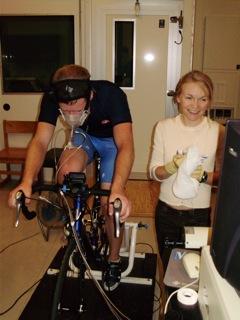
UNH students are eligible to apply to the Exercise Science major if they have an overall GPA of at least 3.0 and have taken BMS 507 Human Anatomy and Physiology I and one additional major required course and earned a grade of C or better in each. Complete criteria and instructions are available in the Application for Internal Transfer Document below. Applications are evaluated twice annually with June 7 and January 7 submission deadlines for admittance the following semester. Available space in the Exercise Science major for internal transfer students varies each year and is dependent on the number of admitted freshmen, number of transfers into and out of the program, and the number of qualified students at the time of application.
To learn more about the Exercise Science major or application process please contact Professor Aurora Vellante at Aurora.Vellante@unh.edu or (603) 862-2193.
Application for Internal Transfer
Standards for Continuing in the Major
External Transfer Students
Students wishing to transfer to the UNH exercise science program from another university should visit the undergraduate admissions website.
Other inquiries can be directed to Aurora Vellante at 603-862-2193 or Aurora.Vellante@unh.edu
Students interested in our Exercise Science major may also be interested in these advanced degree offerings:
